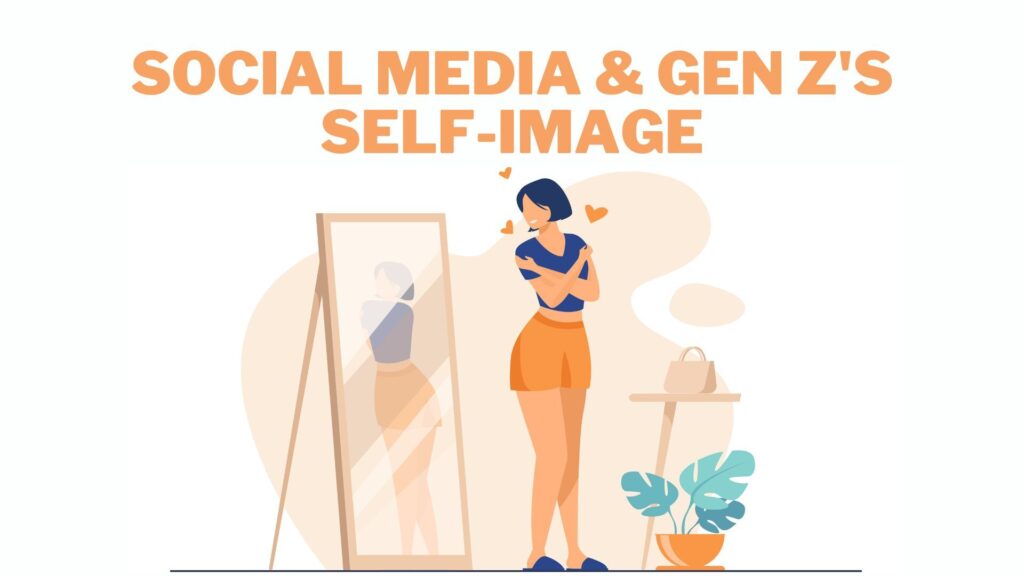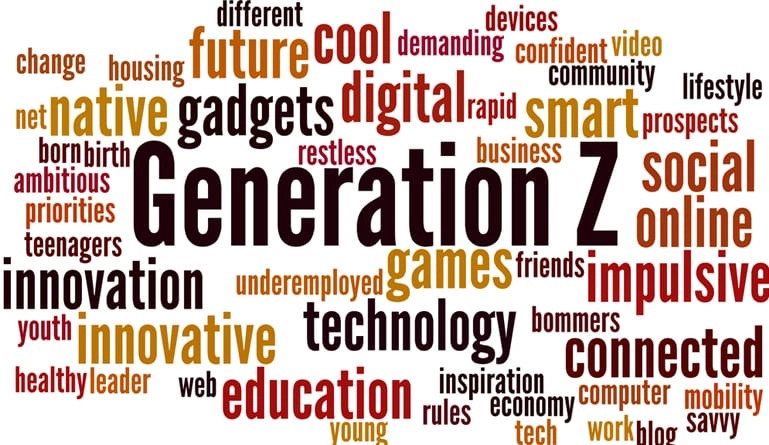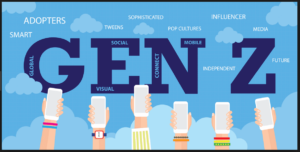The Rise of Gen Z: Exploring the Power and Potential of the Next Generation Generation Z, born between the mid-1990s and early 2010s, is on the rise, reshaping industries and pushing boundaries like never before. With unrivaled digital fluency and an innate desire for social change, this generation is poised to make a lasting impact on the world. In a world saturated with information and technology, Gen Z has mastered the art of multitasking, seamlessly navigating between online platforms and real-life interactions. Their ability to connect with people globally and access an abundance of information instantly empowers them to challenge the status quo and fuel innovation. With a keen eye for authenticity, Gen Z demands transparency from brands and businesses.
They hold immense purchasing power and prioritize companies that align with their values. This tech-savvy generation expects seamless digital experiences, personalized recommendations, and socially responsible practices. As the first truly global generation, Gen Z is culturally diverse, socially conscious, and more vocal about their beliefs than any previous generation. Their influence extends beyond social media activism, shaping market trends and demanding sustainable products and services. In this article, we delve into the power and potential of Gen Z, exploring how businesses can tap into this influential audience and thrive in the ever-evolving digital landscape.
Characteristics and Traits of Generation Z: Navigating the Digital Landscape
Generation Z, born between the mid-1990s and the early 2010s, represents a dynamic and diverse cohort shaped by the digital age, socio-cultural shifts, and global connectivity. As this generation comes of age, it’s crucial to explore the key characteristics and traits that define their worldview and influence their behaviors.
1. Digital Natives:
Generation Z is often referred to as digital natives, having grown up in an era defined by ubiquitous access to technology and the internet. From smartphones to social media platforms, digital devices are seamlessly integrated into their daily lives, shaping their communication styles, social interactions, and consumption habits.
2. Tech-Savvy and Innovative:
With an innate understanding of technology and a penchant for innovation, Gen Z is at the forefront of digital creativity and entrepreneurship. From coding and app development to content creation and digital marketing, members of Gen Z leverage technology to drive innovation, create new opportunities, and solve complex problems.
3. Diversity and Inclusion:
Diversity and inclusion are core values for Generation Z, who champion equality, representation, and social justice. Embracing diversity in all its forms, Gen Z advocates for inclusivity in workplaces, educational institutions, and society at large, recognizing the importance of amplifying marginalized voices and fostering environments that celebrate diversity.
4. Entrepreneurial Spirit:
Driven by a desire for autonomy and self-expression, many members of Gen Z exhibit entrepreneurial tendencies, leveraging digital platforms to launch startups, pursue passion projects, and monetize their creative talents. With a willingness to take risks and embrace failure as part of the learning process, Gen Z thrives in the dynamic and ever-evolving landscape of entrepreneurship.
5. Global Awareness and Activism:
Growing up in an interconnected world, Gen Z is acutely aware of global issues and societal challenges, from climate change and environmental sustainability to political unrest and economic inequality. With a sense of social responsibility and a desire to effect positive change, Gen Z is at the forefront of modern activism, using their voices and digital platforms to advocate for causes they believe in.
6. Pragmatic and Resourceful:
Despite facing economic uncertainty and evolving job markets, Gen Z demonstrates pragmatism and resourcefulness in navigating the complexities of the modern world. With a focus on practical solutions, adaptability, and lifelong learning, Gen Z seeks opportunities that align with their values, interests, and aspirations, forging their own path to success.
7. Mental Health Awareness:
Recognizing the importance of mental health and well-being, Gen Z prioritizes self-care, mental wellness, and seeking support when needed. With increased awareness and destigmatization of mental health issues, Gen Z advocates for open dialogue, access to resources, and destigmatization of seeking help for mental health concerns.
8. Flexibility and Work-Life Balance:
As Gen Z enters the workforce, they prioritize flexibility, work-life balance, and meaningful work over traditional notions of success. With a preference for remote work, flexible schedules, and opportunities for personal growth and development, Gen Z seeks environments that allow them to pursue their passions while maintaining a healthy balance between work and personal life.
The impact of technology on Generation Z
Generation Z, born roughly between the mid-1990s and early 2010s, has been profoundly shaped by technology. Here’s a breakdown of the impact:
- Digital Natives: Growing up in a digital era, Gen Z is highly adept at using technology from an early age. They are comfortable with smartphones, tablets, and computers, often using multiple devices simultaneously.
- Social Media Pioneers: Gen Z’s social lives are largely conducted online through platforms like Instagram, Snapchat, TikTok, and Twitter. They communicate, share experiences, and form connections in a digital environment, influencing their social interactions and behaviors.
- Information Access: Technology has democratized access to information, allowing Gen Z to stay informed about global events, social issues, and cultural trends. They are more aware and socially conscious, using technology to advocate for causes they believe in.
- Digital Identity: Gen Z curates digital personas through social media, expressing their identity, beliefs, and interests online. This digital identity is a significant aspect of their self-expression and how they engage with the world.
- Entrepreneurial Spirit: The rise of e-commerce, social media influencers, and digital marketing has empowered Gen Z to explore entrepreneurial opportunities. Many are starting their own businesses, creating content, and monetizing their online presence.
- Education Transformation: Technology has revolutionized education for Gen Z, providing access to online learning platforms, virtual classrooms, and educational apps. They are accustomed to blended learning approaches and have a preference for interactive, multimedia-rich content.
- Mental Health Challenges: While technology offers connectivity and convenience, it also presents challenges, such as digital addiction, cyberbullying, and social comparison. Gen Z faces mental health issues exacerbated by constant connectivity and pressure to curate a perfect online image.
- Job Market Dynamics: Gen Z enters a rapidly evolving job market shaped by technology and automation. They prioritize flexibility, remote work opportunities, and digital skills development to thrive in the digital economy.
Overall, technology has deeply influenced the worldview, behaviors, and opportunities of Generation Z, shaping them into a generation that is both empowered and challenged by the digital age.
The influence of social media on Generation Z

Social media has had a profound influence on Generation Z, shaping their behaviors, values, and worldview in various ways:
- Communication and Relationships: Social media platforms like Instagram, Snapchat, and TikTok have become integral to how Gen Z communicates and forms relationships. They use these platforms to stay connected with friends, share experiences, and express themselves creatively.
- Identity Formation: Gen Z often constructs their identity and sense of self through social media. They curate their profiles, share aspects of their lives, and engage with communities that reflect their interests and values. Social media plays a significant role in shaping their self-image and how they are perceived by others.
- Influence and Trends: Gen Z is heavily influenced by social media influencers, who shape trends in fashion, beauty, lifestyle, and culture. They look to influencers for inspiration and validation, often emulating their style and behaviors.
- Awareness and Activism: Social media has empowered Gen Z to raise awareness about social issues and advocate for change. They use platforms like Twitter and Instagram to amplify marginalized voices, organize protests, and challenge systemic injustices.
- Mental Health Impact: While social media offers connectivity and community, it also poses risks to Gen Z’s mental health. Excessive use of social media can contribute to feelings of inadequacy, anxiety, and depression, fueled by social comparison and cyberbullying.
- Digital Literacy: Gen Z is highly adept at navigating social media platforms and understanding digital content. They possess strong digital literacy skills, including the ability to discern misinformation, protect their privacy, and engage critically with online content.
- Marketing and Consumer Behavior: Social media plays a central role in shaping Gen Z’s consumer behavior. They are a key demographic for digital marketing campaigns, influenced by social media ads, sponsored content, and brand collaborations.
- Political Engagement: Gen Z uses social media as a platform for political expression and activism. They are vocal about political issues, engage in online debates, and mobilize their peers to participate in civic activities such as voting and advocacy campaigns.
Gen Z’s purchasing power and consumer behavior
Generation Z, the cohort born between the mid-1990s and early 2010s, possesses significant purchasing power and exhibits distinct consumer behavior influenced by their digital fluency, social consciousness, and preference for authenticity. Here are some key characteristics:
- Digital Natives: Gen Z’s upbringing in the digital age has shaped their consumer behavior. They are comfortable with online shopping, mobile payments, and using social media platforms to research products and make purchasing decisions.
- Authenticity Matters: Gen Z values authenticity in brands and products. They are skeptical of traditional advertising and prefer transparent, genuine interactions with brands. Authenticity, social responsibility, and ethical practices influence their brand loyalty and purchasing decisions.
- Socially Conscious Consumers: Gen Z is socially conscious and values brands that align with their values. They support companies that demonstrate environmental sustainability, social responsibility, and ethical business practices. Brands that actively engage in social issues and support causes important to Gen Z earn their loyalty and trust.
- Preference for Personalization: Gen Z expects personalized shopping experiences tailored to their preferences and interests. They respond positively to personalized recommendations, targeted advertisements, and customized product offerings that cater to their individual needs and preferences.
- Influence of Social Media: Social media plays a significant role in Gen Z’s consumer behavior. They rely on platforms like Instagram, TikTok, and YouTube for product discovery, reviews, and recommendations from peers and influencers. Social media influencers have a considerable influence on Gen Z’s purchasing decisions, as they trust recommendations from individuals they follow online.
- Value and Quality Conscious: Despite their affinity for digital experiences, Gen Z is value-conscious and seeks quality products at affordable prices. They are willing to invest in products that offer value, durability, and functionality. However, they prioritize experiences over material possessions and are more likely to spend on experiences like travel, dining, and entertainment.
- Preference for Convenience: Gen Z values convenience and seamless shopping experiences. They prefer brands that offer fast and reliable delivery options, easy returns, and hassle-free online shopping experiences. Brands that prioritize convenience and accessibility across digital and physical channels are more likely to attract and retain Gen Z consumers.
Marketing strategies to reach Gen Z

Here are some effective strategies to engage and connect with Gen Z consumers:
1. Authentic Content Creation:
Generation Z values authenticity and transparency in brand communication. Create genuine, relatable content that showcases your brand’s personality, values, and mission. Utilize user-generated content, behind-the-scenes footage, and real-life stories to build trust and credibility with Gen Z audiences.
2. Leverage Social Media Platforms:
Gen Z is highly active on social media platforms like Instagram, TikTok, and Snapchat. Develop a strong presence on these platforms by creating engaging and visually appealing content that aligns with Gen Z’s interests and preferences. Collaborate with influencers and micro-influencers to amplify your brand message and reach a wider audience.
3. Embrace Video Marketing:
Video content is king when it comes to reaching Gen Z. Create short-form videos, tutorials, and product demos that capture attention and convey your brand message in a concise and entertaining manner. Experiment with interactive features like polls, quizzes, and challenges to encourage active participation and engagement.
4. Personalize the Customer Experience:
Gen Z expects personalized experiences tailored to their individual preferences and needs. Leverage data analytics and AI-driven technologies to gather insights into consumer behavior and deliver personalized recommendations, product suggestions, and targeted advertisements that resonate with Gen Z’s interests and shopping habits.
5. Champion Social Causes:
Gen Z is socially conscious and values brands that demonstrate a commitment to social and environmental issues. Take a stand on relevant causes and incorporate purpose-driven initiatives into your marketing campaigns. Support causes that align with Gen Z’s values, such as sustainability, diversity, inclusion, and mental health awareness.
6. Foster Community Engagement:
Create opportunities for Gen Z consumers to connect with your brand and each other. Foster community engagement through online forums, social media groups, and virtual events where Gen Z can share experiences, discuss topics of interest, and feel like part of a larger community. Encourage user-generated content and user-generated marketing campaigns to empower Gen Z to become brand advocates.
7. Optimize for Mobile:
Gen Z is a mobile-first generation, relying heavily on smartphones for communication, entertainment, and shopping. Ensure that your marketing strategies and digital experiences are optimized for mobile devices, including responsive website design, mobile-friendly content formats, and seamless mobile checkout processes.
Engaging with Generation Z through content creation
Engaging with Generation Z through content creation requires a deep understanding of their preferences, behaviors, and values. To effectively connect with this digitally native and socially conscious demographic, consider the following strategies for creating compelling content:
1. Authenticity is Key:
Generation Z values authenticity above all else. Create genuine, relatable content that reflects your brand’s personality, values, and mission. Avoid overly polished or sales-focused content, and instead, strive for authenticity and transparency in your communication.
2. Visual and Interactive Content:
Utilize visually appealing and interactive content formats to capture and maintain Gen Z’s attention. Experiment with short-form videos, interactive polls, quizzes, and challenges to engage Gen Z audiences and encourage active participation.
3. User-Generated Content:
Empower your audience to become content creators by encouraging user-generated content (UGC). Provide opportunities for Gen Z consumers to share their experiences, stories, and opinions related to your brand or products. Showcase UGC on your social media channels and website to foster a sense of community and authenticity.
4. Embrace Trends and Memes:
Stay current with the latest trends, memes, and cultural references that resonate with Gen Z. Incorporate relevant pop culture elements into your content to demonstrate cultural awareness and connect with Gen Z’s sense of humor and style.
5. Purpose-Driven Messaging:
Align your content with social and environmental causes that matter to Generation Z. Incorporate purpose-driven messaging into your content strategy, highlighting your brand’s commitment to sustainability, diversity, inclusion, and social justice. Showcasing your brand’s values and impact can resonate deeply with Gen Z consumers.
6. Educate and Inform:
Generation Z values educational content that provides value and utility. Create informative and educational content that helps Gen Z consumers solve problems, learn new skills, or stay informed about topics relevant to their interests and aspirations.
7. Engage in Conversations:
Encourage two-way communication and engagement with Gen Z by fostering conversations around your content. Respond to comments, messages, and mentions from Gen Z consumers promptly and authentically. Actively listen to their feedback, address their concerns, and incorporate their input into your content strategy.
8. Mobile Optimization:
Optimize your content for mobile devices, as Generation Z predominantly consumes content on smartphones. Ensure that your website, videos, and other digital content formats are mobile-friendly and load quickly on mobile devices to provide a seamless user experience.
9. Collaborate with Influencers:
Partner with influencers and content creators who resonate with Generation Z to amplify your brand message and reach a wider audience. Choose influencers who align with your brand values and have an authentic connection with their followers to ensure credibility and authenticity.
The role of influencers in reaching Generation Z

Influencers play a pivotal role in reaching Generation Z by serving as authentic voices that resonate with their peers. With Gen Z’s preference for genuine, relatable content, influencers provide a bridge between brands and consumers, effectively conveying brand messages in a way that feels authentic and trustworthy. By leveraging influencers who align with their values and interests, brands can tap into Gen Z’s social networks, amplify their brand message, and drive engagement and loyalty among this influential demographic. Influencers’ ability to create compelling content, foster community engagement, and authentically connect with their followers makes them invaluable partners for brands seeking to reach Generation Z effectively.
Challenges and opportunities when targeting Generation Z
Challenges:
- Short Attention Spans: Generation Z has grown up in a digital age with endless options for entertainment and information. Capturing and maintaining their attention amidst constant distractions can be challenging for marketers.
- Skepticism of Traditional Advertising: Gen Z is adept at filtering out traditional advertising messages. They value authenticity and are skeptical of overly promotional content, making it difficult for brands to break through the noise.
- High Expectations for Authenticity: Gen Z values authenticity and transparency in brand communication. Any perceived lack of authenticity can lead to distrust and disengagement from the brand.
- Constantly Evolving Trends: Keeping up with the rapidly changing preferences, trends, and cultural shifts of Gen Z requires agility and adaptability from marketers.
Opportunities:
- Digital Savvy Consumers: Gen Z’s comfort with technology presents opportunities for brands to engage with them through innovative digital channels, such as social media, influencer partnerships, and interactive content.
- Preference for Personalization: Gen Z expects personalized experiences tailored to their individual preferences and needs. Brands can leverage data analytics and AI technologies to deliver targeted and personalized marketing messages that resonate with Gen Z consumers.
- Socially Conscious Values: Gen Z is passionate about social and environmental issues. Brands that align with their values and demonstrate a commitment to social responsibility have the opportunity to build strong connections and loyalty with Gen Z consumers.
- Influencer Marketing: Influencers play a significant role in reaching and influencing Gen Z. Partnering with influencers who have authentic connections with their audience can help brands amplify their message and reach a wider audience of Gen Z consumers.
- Content Creation: Gen Z is drawn to engaging, authentic, and visually appealing content. Brands that can create compelling content that tells a story and sparks conversation have the opportunity to capture Gen Z’s attention and foster deeper connections with their audience.
Conclusion: Embracing the power of Gen Z
In conclusion, embracing the power of Generation Z presents both challenges and opportunities for marketers and brands alike. This digitally native and socially conscious cohort brings a unique set of characteristics and preferences that require a thoughtful and strategic approach to engagement. While navigating the short attention spans, skepticism of traditional advertising, and constantly evolving trends can be daunting, the rewards of effectively connecting with Gen Z are substantial.
By understanding and leveraging the digital savvy, preference for authenticity, and socially conscious values of Generation Z, brands can unlock opportunities to build meaningful connections and drive brand loyalty. From personalized marketing messages and authentic influencer partnerships to compelling content creation and alignment with social causes, there are numerous avenues for brands to engage with Gen Z consumers authentically and effectively.
Ultimately, embracing the power of Generation Z requires a willingness to adapt, innovate, and stay attuned to the ever-changing preferences and behaviors of this influential demographic. By embracing this challenge and seizing the opportunities it presents, brands can position themselves for success in an increasingly digital and socially conscious marketplace, ensuring long-term relevance and resonance with Generation Z consumers.


